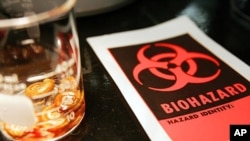Treatment for the parasitic illness schistosomiasis is more effective if children have a snack before receiving the drug praziquantel.
That's the finding of a study conducted in Uganda's Jinja district by researchers from Makerere University in Kampala. They worked with students at 12 primary schools. In addition to an educational message about the parasite, children at some of the schools were given donuts and mango juice prior to treatment.
Four weeks later, stool samples were collected from a random sample of 1,284 youngsters to test for the presence of schistosome eggs. Researchers report in the journal PLOS Medicine that children who ate something before getting the medicine had half as many eggs in their stool as those at non-snack schools.
Because food improved uptake of the drug, researchers also found a lower intensity of infection with the parasite S. mansoni in those who snacked. In addition, the youngsters who ate reported fewer side effects from the drug.
Experts say schistosomiasis is second only to malaria as the most devastating parasitic illness. It primarily affects the urinary tract and intestines. Chronic infection can lead to kidney disease, bladder cancer or infertility.
According to the World Health Organization, some 250 million people received preventive treatment with praziquantel in 2012 and 42 million were treated for infection. Ninety percent of cases occur in sub-Saharan Africa, although clusters of infection are seen in tropical and sub-tropical regions in Asia and the Middle East. Because children are most vulnerable to infection, the WHO recommends mass treatment campaigns of school children with praziquantel.
The parasitic worm is carried by freshwater snails and the disease is often contracted through bathing or swimming. The worms burrow into the tissues of internal organs after gaining access through the skin.
That's the finding of a study conducted in Uganda's Jinja district by researchers from Makerere University in Kampala. They worked with students at 12 primary schools. In addition to an educational message about the parasite, children at some of the schools were given donuts and mango juice prior to treatment.
Four weeks later, stool samples were collected from a random sample of 1,284 youngsters to test for the presence of schistosome eggs. Researchers report in the journal PLOS Medicine that children who ate something before getting the medicine had half as many eggs in their stool as those at non-snack schools.
Because food improved uptake of the drug, researchers also found a lower intensity of infection with the parasite S. mansoni in those who snacked. In addition, the youngsters who ate reported fewer side effects from the drug.
Experts say schistosomiasis is second only to malaria as the most devastating parasitic illness. It primarily affects the urinary tract and intestines. Chronic infection can lead to kidney disease, bladder cancer or infertility.
According to the World Health Organization, some 250 million people received preventive treatment with praziquantel in 2012 and 42 million were treated for infection. Ninety percent of cases occur in sub-Saharan Africa, although clusters of infection are seen in tropical and sub-tropical regions in Asia and the Middle East. Because children are most vulnerable to infection, the WHO recommends mass treatment campaigns of school children with praziquantel.
The parasitic worm is carried by freshwater snails and the disease is often contracted through bathing or swimming. The worms burrow into the tissues of internal organs after gaining access through the skin.





